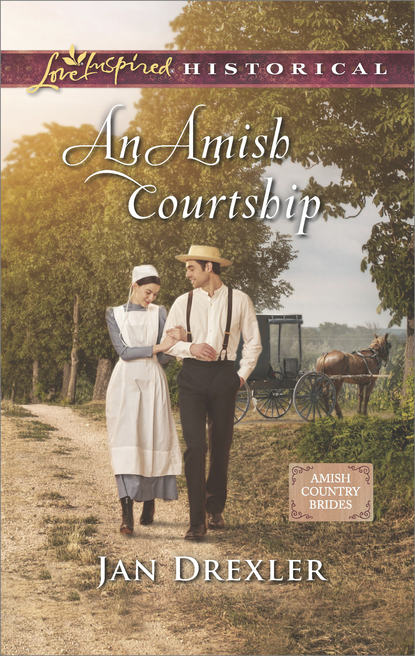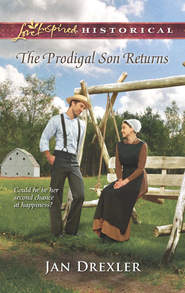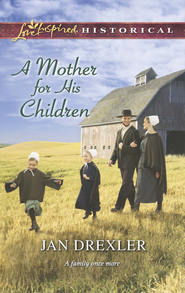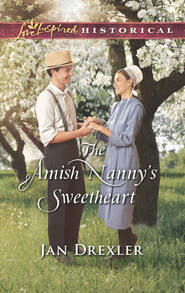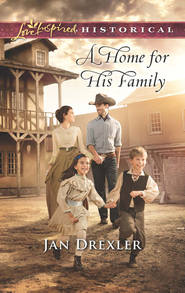По всем вопросам обращайтесь на: info@litportal.ru
(©) 2003-2025.
✖
An Amish Courtship
Настройки чтения
Размер шрифта
Высота строк
Поля
“She’s waiting for you.”
Samuel looked past Mary and Sadie. Annie had glanced his way again, and had pulled her lower lip in between her teeth.
“Go on,” Mary said. She pushed at his arm. “It’s time.”
His eyes met hers then, pleading with them as one of her younger brothers would do, but he climbed down from the buggy. Mary followed him and helped Sadie to the ground as she watched him greet his sister.
“Hello, Annie.”
He stood back, but his sister reached toward him and grasped his hand.
“I’m so glad you came.” Her eyes sparkled with tears. “I’ve missed you. All of you.”
Sadie pulled on Mary’s arm, and she led the way into the house with Ida Mae following.
“We’ll let the four of them get acquainted again without us interfering.”
Other buggies had already arrived, and as Mary stepped onto the porch, she could hear the hum of voices from inside the house. She swallowed down the thickness in her throat at the thought of all the strangers on the other side of that door, but she didn’t have time to be nervous as Sadie walked in. They laid their bonnets with the others on a bed in the room off the kitchen, then followed the sound of women visiting.
The front room was filled with a quilt on a frame, and ten or twelve women sat around it, needles in their hands and all talking at once. Sadie led Ida Mae to three empty chairs on the far side of the quilt, stopping to greet the women they passed on the way.
“Good morning, Elizabeth.” She grasped an older woman’s shoulder. “These are my nieces from Ohio, Mary and Ida Mae.” She went on to the next woman, a younger image of the first one. “And Ellie, I’m so glad you’re here. Meet my nieces.”
Mary had hardly had a chance to greet Elizabeth when she met Ellie’s blue eyes. “I’m so happy to meet you. I’m Ellie Lapp.”
“Lapp? Are you related to Esther and Judith?”
“Ja, for sure.” Ellie’s smile was relaxed and welcoming. “Their brother Bram is my husband, but I’ve never met the girls.” She stuck her needle in the quilt and half rose from her seat. “Did they come with you? Are they outside?”
“They’re talking with Annie. Samuel is there, too.”
Ellie sat back in her chair. “Samuel came?”
“He said he had some business here in Eden Township, so he drove us down here this morning.”
A little boy, about two years old, crawled out from under the quilting frame and pulled on Ellie’s skirt. “Memmie, I’m thirsty.”
Ellie cupped his head in her hand, a worried frown on her face. “Ja, Danny. We’ll go to the kitchen and get a drink.” She smiled at Mary, her brows still knit. “I’m so glad to meet you, Mary, and I hope we’ll be able to get to know each other better.”
She took the little boy by the hand and led him into the kitchen as Mary made her way to the chair next to Sadie and Ida Mae. For the first time, she wondered what business Samuel had in Eden Township. Whatever it was, it had Ellie worried.
* * *
Samuel let Tilly choose her own pace as he set off down the road toward Bram’s farm. Annie’s welcome had bolstered his courage enough to ask for directions to their brother’s home, but when he saw Bram’s wife peering at them through Annie’s kitchen window, doubts began to crowd in again.
Meeting Bram wouldn’t be as easy as seeing Annie again. His sister had always been quick to forgive and easy to talk to. Bram had never been easy to deal with.
Samuel stopped at a crossroad. Annie had said he would turn right after he passed over the creek, and he could see the wandering line of trees and bushes that marked the creek’s progress through the fields ahead. Only one more mile before he turned onto Bram’s road. When he clucked to Tilly, she shook her head and started off at a brisk trot.
He and Bram had never enjoyed the kind of brotherly love he saw in other families. Daed had pushed at them, and Samuel could hear his voice now. “Bram can do it. Why can’t you?”
And then Bram would look at him with his superior, big-brother look that would spike Samuel’s temper.
Whether it was pitching hay down from the loft or hauling buckets of slop for the hogs, Bram had always done it better, faster, easier.
Even after Bram had abandoned the family, Daed had kept goading at Samuel, pushing him to be the man Bram was.
But he wasn’t Bram. He didn’t leave. He had stayed and absorbed the brunt of Daed’s anger right until the end.
Samuel fingered the reins. Why hadn’t he left? He could have followed Bram, but he shied away from the accusing voice in his head that said he had been too cowardly to strike out on his own. His eyes stung and he rubbed at them. He wasn’t a coward. He was the good son. The one who had stayed home. But Mamm had still died.
Tilly trotted across the culvert over the stream and the next crossroad was in sight. A quarter mile west, Annie had said. His stomach churned with something. Anger? Resentment? Or was he only nervous?
Samuel pulled Tilly to a stop at the corner. He didn’t have to turn. He could continue down this road, find a spot to rest until it was time to pick up the girls again and face Bram another day.
But he was done with putting things off. That’s the way Daed would have handled this. He would have ignored Bram, pretended he didn’t exist to punish him for taking off to Chicago all those years ago. If he was going to come out from his daed’s shadow, he needed to face Bram.
Make amends.
He turned the corner and headed west, keeping Tilly’s pace to a slow trot, even though she shook her head in protest. Samuel kept the reins tight, holding her in. He wanted time.
The farm was on the left after he crossed another little creek. A Dawdi Haus nestled in the grass near the creek, with a flower garden in the front. The main house stood on a rise near it, and a white barn sat at the back of the lane. A field next to the lane was planted with corn, and the stalks stood nearly a foot high. A team of four matching Belgian horses grazed in the pasture beyond the barn.
Samuel pulled Tilly to a halt in the road. The horses in the pasture meant that Bram was at home, not out in the fields. He fought the urge to keep driving down the road and turned Tilly into the lane. Someone had seen him coming. An old man watched him from the porch of the Dawdi Haus, but Samuel followed the sound of metal hammering on metal that rang from the barn.
He halted Tilly near the barn door and climbed out of the buggy. The ringing continued. He tied the horse to the rail alongside the barn. No break in the rhythmic hammering from inside.
Looking around, Samuel spied the old man, who had walked up to the main house and stood on the front porch. He lifted his hand in a wave and Samuel returned the gesture. There was no alternative now except to face Bram. Wiping his hands on his trousers, he walked into the barn.
Just inside the door, he stopped to let his eyes adjust to the dim light. Bram was at the end of the main bay, working on a plow, his back to the door. A boy stood next to him. The seven-year-old held his hands over his ears to block out the noise, but leaned as close to Bram as he could, fascinated by the work.
Bram stopped hammering and bent down to inspect his work. “You see here, Johnny,” he said as he pointed, “that was the piece that had come loose. But now it’s fastened in good and tight and should work fine.”
Samuel walked toward them and the boy saw him.
“Daed, someone’s here.”
Bram straightened and turned, a welcoming smile on his face until he saw who it was.
“Samuel.” His voice held a note of surprise.
“Hello, Bram.”
Bram pulled off his gloves and laid one hand on the boy’s shoulder without taking his gaze away from Samuel. “Johnny, we’re done here. Why don’t you go see if your grossdawdi needs any help?”
Johnny ran out the back door of the barn and Bram stepped closer.
“I didn’t expect to see you.”





